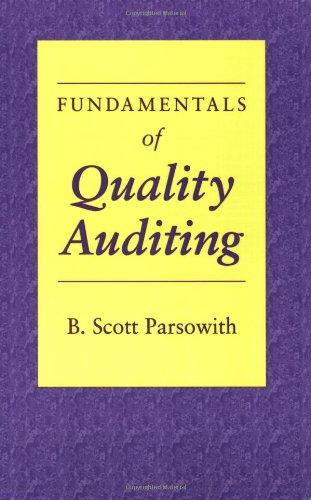Question
The CPA firm of Bigelow, Barton, and Brown was expanding rapidly. Consequently, it hired several junior accountants, including a man named Small. The partners of
The CPA firm of Bigelow, Barton, and Brown was expanding rapidly. Consequently, it hired several junior accountants, including a man named Small. The partners of the firm eventually became dissatisfied with Small's productivity and warned him they would be forced to discharge him unless his output increased significantly.
At that time, Small was engaged in audits of several clients. He decided that to avoid being fired, he would reduce or omit some of the standard auditing procedures listed in audit programs prepared by the partners. One of the CPA firm's clients, Newell Corporation, was in serious financial difficulty and had adjusted several of the accounts being audited by Small to appear financially sound. Small prepared fictitious audit documentation in his home at night to support purported completion of auditing procedures assigned to him, although he in fact did not examine the adjusting entries. The CPA firm rendered an unmodified opinion on Newell's financial statements, which were grossly misstated. Several creditors, relying on the audited financial statements, subsequently extended large sums of money to Newell Corporation.
Will the CPA firm be liable to the creditors who extended the money because of their reliance on the erroneous financial statements if Newell Corporations should fail to pay them? Explain.
(1) _____. Normally a CPA firm (2) _____ be liable to third parties with whom it has neither dealt nor for whose benefit its work was performed. One notable exception to this rule is (3) _____. In this instance, Small and/or the CPA firm have made (4) _____. The auditor's performance was (5) _____ because the opinion was based on a (6) _____. Based on this, it would appear that (7) _____ is present and, therefore, the firm (8) _____ liable to third parties who relied on the financial statements and suffered a loss as a result.
 (1) No. (2) will (3) acceptable audit risk. Yes. will not contributory negligence. fraud, which can be either actual or constructive. (4) a deliberate falsehood with the intent to deceive. every attempt to allow the client to maintain financial statement ownership. every precaution to follow GAAP procedures. no deliberate falsehoods with the requisite intent to deceive. (6) client's inappropriate accounting. reckless disregard for the truth. (7) actual acceptable audit risk actual fraud actual negligence constructive acceptable audit risk (5) found to be acceptable grossly negligent (8) is constructive contributory negligence is not
(1) No. (2) will (3) acceptable audit risk. Yes. will not contributory negligence. fraud, which can be either actual or constructive. (4) a deliberate falsehood with the intent to deceive. every attempt to allow the client to maintain financial statement ownership. every precaution to follow GAAP procedures. no deliberate falsehoods with the requisite intent to deceive. (6) client's inappropriate accounting. reckless disregard for the truth. (7) actual acceptable audit risk actual fraud actual negligence constructive acceptable audit risk (5) found to be acceptable grossly negligent (8) is constructive contributory negligence is not Step by Step Solution
There are 3 Steps involved in it
Step: 1

Get Instant Access to Expert-Tailored Solutions
See step-by-step solutions with expert insights and AI powered tools for academic success
Step: 2

Step: 3

Ace Your Homework with AI
Get the answers you need in no time with our AI-driven, step-by-step assistance
Get Started


